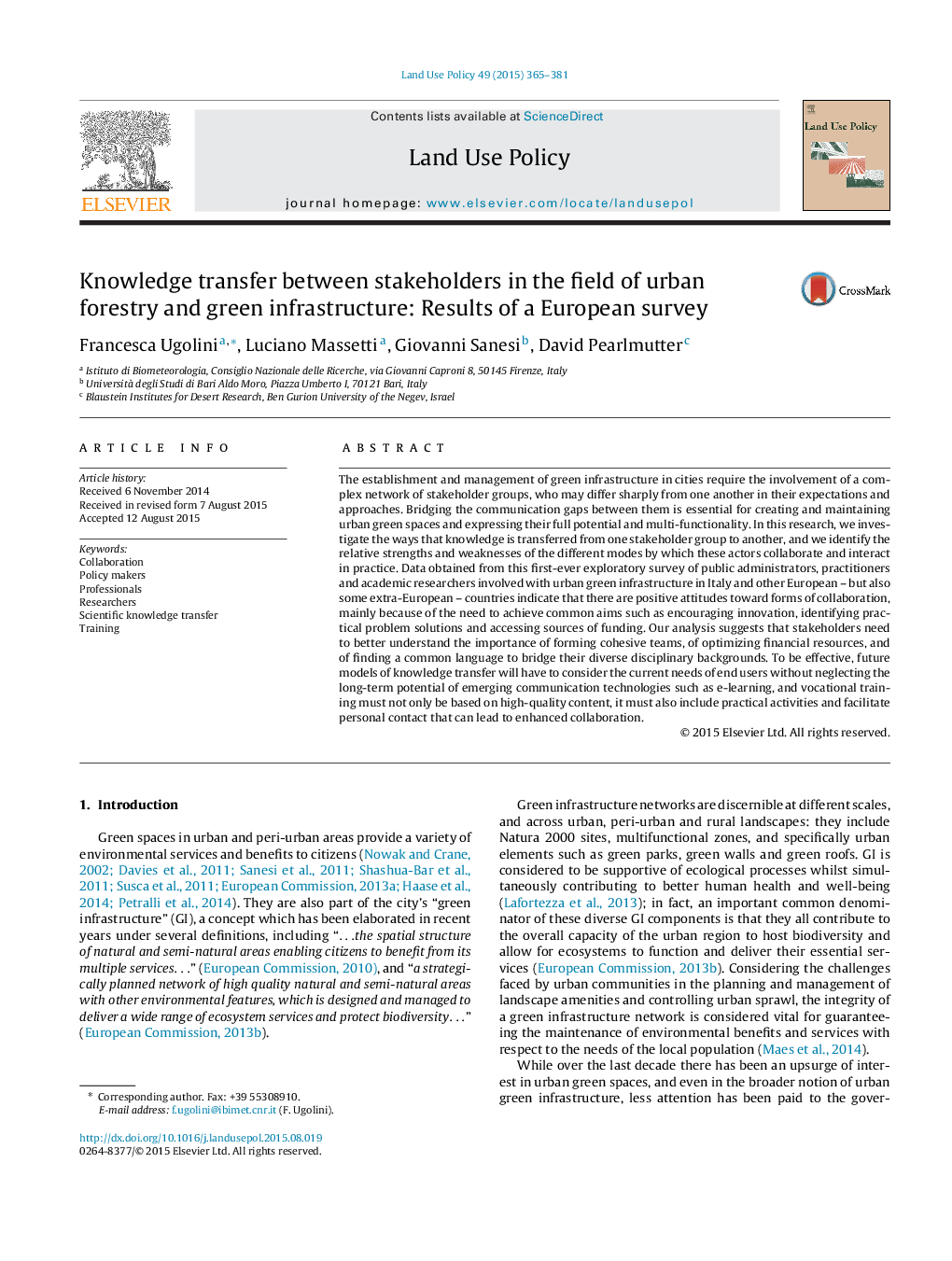| کد مقاله | کد نشریه | سال انتشار | مقاله انگلیسی | نسخه تمام متن |
|---|---|---|---|---|
| 6547777 | 160102 | 2015 | 17 صفحه PDF | دانلود رایگان |
عنوان انگلیسی مقاله ISI
Knowledge transfer between stakeholders in the field of urban forestry and green infrastructure: Results of a European survey
ترجمه فارسی عنوان
انتقال دانش بین سهامداران در زمینه جنگلداری شهری و زیرساخت سبز: نتایج یک نظرسنجی اروپایی
دانلود مقاله + سفارش ترجمه
دانلود مقاله ISI انگلیسی
رایگان برای ایرانیان
کلمات کلیدی
همکاری، سیاست گذاران، حرفه ای ها، محققان، انتقال دانش علمی، آموزش،
ترجمه چکیده
ایجاد و مدیریت زیرساخت های سبز در شهرها نیازمند دخالت یک شبکه پیچیده از گروه های ذینفع است که ممکن است در انتظارات و رویکردهایشان از یکدیگر متمایز باشند. شکاف ارتباطی بین آنها برای ایجاد و حفظ فضاهای سبز شهری و بیان پتانسیل کامل و قابلیت چند کاره ضروری است. در این تحقیق، روش هایی را که دانش از یک گروه ذینفع به یک دیگر منتقل می شود، بررسی می کنیم و نقاط قوت و ضعف نسبی حالت های مختلفی را که آنها در عمل عمل می کنند و همکاری می کنند شناسایی می کنیم. داده های به دست آمده از این بررسی نخستین بررسی اکتشافی از مدیران عمومی، پزشکان و محققان دانشگاهی که با زیرساخت های سبز شهری در ایتالیا و دیگر کشورهای اروپایی - بلکه بعضی از کشورهای اروپایی بیشتر برخوردارند، نشان می دهد که نگرش مثبت نسبت به شکل همکاری، عمدتا به دلیل نیاز به دستیابی به اهداف مشترک مانند تشویق نوآوری، شناسایی راه حل های عملی و دسترسی به منابع مالی. تجزیه و تحلیل ما نشان می دهد که ذینفعان باید بهتر درک اهمیت تشکیل تیم های یکپارچه، بهینه سازی منابع مالی و پیدا کردن یک زبان مشترک برای پر کردن زمینه های مختلف انضباطی خود را. برای موثر بودن، مدل های آینده انتقال دانش باید نیازهای فعلی کاربران نهایی را بدون در نظر گرفتن پتانسیل بلند مدت فناوری ارتباطات در حال ظهور مانند آموزش الکترونیکی و آموزش حرفه ای نه تنها بر اساس محتوای با کیفیت بالا، همچنین باید شامل فعالیت های عملی و برقراری تماس شخصی باشد که می تواند منجر به همکاری بیشتر شود.
موضوعات مرتبط
علوم زیستی و بیوفناوری
علوم کشاورزی و بیولوژیک
جنگلداری
چکیده انگلیسی
The establishment and management of green infrastructure in cities require the involvement of a complex network of stakeholder groups, who may differ sharply from one another in their expectations and approaches. Bridging the communication gaps between them is essential for creating and maintaining urban green spaces and expressing their full potential and multi-functionality. In this research, we investigate the ways that knowledge is transferred from one stakeholder group to another, and we identify the relative strengths and weaknesses of the different modes by which these actors collaborate and interact in practice. Data obtained from this first-ever exploratory survey of public administrators, practitioners and academic researchers involved with urban green infrastructure in Italy and other European - but also some extra-European - countries indicate that there are positive attitudes toward forms of collaboration, mainly because of the need to achieve common aims such as encouraging innovation, identifying practical problem solutions and accessing sources of funding. Our analysis suggests that stakeholders need to better understand the importance of forming cohesive teams, of optimizing financial resources, and of finding a common language to bridge their diverse disciplinary backgrounds. To be effective, future models of knowledge transfer will have to consider the current needs of end users without neglecting the long-term potential of emerging communication technologies such as e-learning, and vocational training must not only be based on high-quality content, it must also include practical activities and facilitate personal contact that can lead to enhanced collaboration.
ناشر
Database: Elsevier - ScienceDirect (ساینس دایرکت)
Journal: Land Use Policy - Volume 49, December 2015, Pages 365-381
Journal: Land Use Policy - Volume 49, December 2015, Pages 365-381
نویسندگان
Francesca Ugolini, Luciano Massetti, Giovanni Sanesi, David Pearlmutter,
